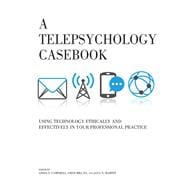This casebook provides practical recommendations on a range of issues associated with electronic-based mental health care.
From technologies as simple as the telephone to more advanced webcams and mobile device applications, psychologists are increasingly using technology in their work---a practice known as telepsychology. Telepsychology allows clinicians to conduct remote therapy sessions, supplement in-person sessions with resources and follow-up care, collect and store client data, and more.
The book’s recommendations draw from the Guidelines for the Practice of Telepsychology, which were created jointly by the American Psychological Association, the Association of State and Provincial Psychology Boards, and the American Insurance Trust. Each chapter presents a guideline, explains how it relates to professional ethics and standards of care, and applies it to case examples. The richly nuanced case examples depict a broad range of dilemmas that psychologists may encounter when conducing telepsychology, as well as a broad range of settings, including hospitals, community health centers, private practice, industrial/organizational settings, forensic settings, academia, military, and veterans’ centers. Whatever setting you practice in, you will find guidance for applying technology effectively, legally, and ethically.
From technologies as simple as the telephone to more advanced webcams and mobile device applications, psychologists are increasingly using technology in their work---a practice known as telepsychology. Telepsychology allows clinicians to conduct remote therapy sessions, supplement in-person sessions with resources and follow-up care, collect and store client data, and more.
The book’s recommendations draw from the Guidelines for the Practice of Telepsychology, which were created jointly by the American Psychological Association, the Association of State and Provincial Psychology Boards, and the American Insurance Trust. Each chapter presents a guideline, explains how it relates to professional ethics and standards of care, and applies it to case examples. The richly nuanced case examples depict a broad range of dilemmas that psychologists may encounter when conducing telepsychology, as well as a broad range of settings, including hospitals, community health centers, private practice, industrial/organizational settings, forensic settings, academia, military, and veterans’ centers. Whatever setting you practice in, you will find guidance for applying technology effectively, legally, and ethically.








